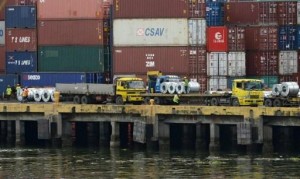MANILA, Philippines – The Bureau of Customs has extended its operating hours at the Port of Manila (POM) and the Manila International Container Port (MICP) to address the adverse effects of the Manila city government’s expanded truck ban on the revenue collection efforts of the Department of Finance-attached agency.
BOC collections at the POM and the MICP, two of the country’s biggest ports, are reportedly down by P100 million to P150 million a day due to the truck ban, which has been imposed by Manila City Hall since Feb. 24.
Customs Commissioner John Phillip Sevilla has issued a directive authorizing BOC personnel at the POM and the MICP to render overtime services seven days a week and even on public holidays when necessary.
In Customs Memorandum Order No. 09-2014, dated May 8, he said the bureau’s X-ray units and the Management and Information System Technology Group will also be “directly involved in the needed extended operating hours.”
However, the BOC head clarified “overtime services with pay shall be allowed only for incumbents of plantilla positions of division chiefs and below, as well as casual employees.”
“Overtime services shall include those rendered beyond eight hours of work on a regular work day (Monday to Friday), those rendered on rest days (Saturday and Sunday) and those rendered on public holidays,” he explained.
According to Sevilla “payment of overtime services shall be charged against savings of the Bureau of Customs, which may be determined at the end of every quarter by the Budget Division.”
The revised truck ban has also resulted in longer working hours for employees of the state-run Land Bank of the Philippines and the Development Bank of the Philippines.
The move was aimed to facilitate transactions with importers and exporters and receive payment for Customs duties and other fees, said LBP and DBP officials.
In a statement, the BOC said private businesses, as well as the government’s revenue collections, have been hurt by the truck ban.
It noted that on the first day of the ban on Feb. 24 alone, the release of container vans of imported goods from the MICP fell from an average of 2,190 per day to just four.
At the POM, it dropped from an average of 1,200 daily to zero.
Initially, trucks and other vehicles with gross weight of at least 4,500 kilograms were not allowed in the streets of Manila from 5 a.m. to 9 p.m.
A temporary concession was offered by the city government allowing trucks to ply city streets between 10 a.m. and 5 p.m. during the next six months. This is seven hours longer than the previous scheme.
There is no truck ban on Saturdays and Sundays. Exempted from the ban are trucks carrying perishable and petroleum product, as well as vehicles carrying materials intended for government projects.
The truck ban prompted trucking firms to hike their hauling charges by an average of 50 percent, a move that may lead to an increase in the prices of goods for consumers.
Last week, the Aduana Business Club, one of the groups protesting the expanded truck ban, sought the help of tycoon Lucio Tan in convincing Manila Mayor Joseph Estrada to change his mind about the traffic scheme.
Tan, the president emeritus of the Federation of Filipino-Chinese Chambers of Commerce and Industry and whose business empire includes interests in the airline, banking, tobacco and real estate industries, backed Estrada in his rise to the presidency.
Last May 6, an unnamed emissary of Tan reportedly met with Estrada, who later told reporters they were “still studying the issue…We have to balance things.”
Asked about the situation at Manila’s Port Area, the former president said, “I think the national government should do something about it.”
Other business groups, such as the European Chamber of Commerce in the Philippines and the Federation of Philippine Industries, have warned that the expanded truck ban would cripple, if not result in closure of some businesses and job losses, and likely cut the growth in production and export of goods.
RELATED STORY
Truckers group kick off new protest against Manila truck ban
